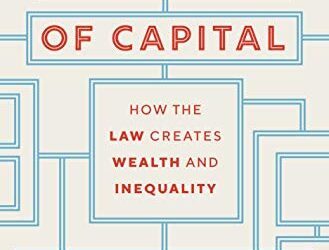Recorded on October 13, 2020, this online panel focused on the book, Let them Eat Tweets: How the Right Rules in an Age of Extreme Inequality, co-authored by Paul Pierson, the John Gross Endowed Chair and Professor of Political Science at UC Berkeley, and Jacob Hacker, Stanley B. Resor Professor and Director of the Institution for Social and Policy Studies at Yale University. This book explores how the modern Republican Party has come to be defined by “plutocratic pluralism,” which combines an elite-benefiting economic agenda with populist appeals.
Theda Skocpol, the Victor S. Thomas Professor of Government and Sociology at Harvard University, and Christopher Parker, Stuart A. Scheingold Professor of Social Justice and Political Science in the Department of Political Science at the University of Washington, responded as “critics” of the book. Both Skocpol and Parker have authored books on topics directly relevant to today’s GOP — including the Tea Party. “I think these are the authors of the two best books on the Tea Party, which I think is critical for understanding how we got to where we are,” Pierson said.
Moderated by Irene Bloemraad, Class of 1951 Professor of Sociology at UC Berkeley, the lively dialogue began with an introductory overview by the two authors. Pierson explained that the book was a response to the fact that the “dramatic shift in the distribution of economic resources in the United States was not being sufficiently considered in in the discussion of where Donald Trump comes from and how he came to occupy the position in American politics that he did.” Pierson pointed out that wealth inequality is far greater in the United States than in Europe. “There is a tendency to lump what’s happening in the United States together with the explosion of right-wing populism that you see in various countries in Western Europe — and of course, there are important similarities — but this suggests that there are also very dramatic differences.”
Let Them Eat Tweets illustrates how the rise in inequality in the U.S. poses challenges for democratic politics. “As inequality grows, there’s likely to be more of a divergence of preferences and interest between the wealthy and everyone else — so the things that are going to benefit ordinary citizens in the economic sphere are not going to be beneficial to those economic elites,” Pierson explained. “Economic elites are likely to become more suspicious of democracy, and they’re going to work harder to make sure that voters are not going to use their numbers to overcome and possibly redistribute the economic resources that are increasingly concentrated at the top.”
In his comments, Hacker stressed the vital role that organizations have played in shaping the modern Republican Party, as groups like the NRA and various Christian Right organizations have become entwined with the party’s platform. “This is another respect in which the American landscape is distinctive,” Hacker said. “We have this ecosystem of right wing media that is willing and capable of deploying highly racialized, anti-government themes in a way that turns out to be mobilizing for a core group of voters.”
In her response, Skocpol largely praised the authors for showing how the GOP has evolved since the 1980s by “using all the levers available in the U.S. constitutional and federal system to further narrow majoritarian governing agendas.” However, she noted that the book would have benefited from a more clearly articulated causal argument. “I’d like to have seen a lot more precision about the various organizational networks that are in play in and around the Republican Party,” she said, adding that she would have also liked to see an analysis of the Democratic Party’s own role in allowing the rise of the modern GOP.
In his comments, Christopher Parker posed a series of questions to the authors, including what they think is different about the role of race today compared to earlier eras. “In the early part of the 20th century, during the Gilded Era, we saw massive amounts of inequality,” Parker said. “But we didn’t see any sort of racial conflict at the behest of other plutocrats…. If your theory is correct, we should have seen plutocrats try to stoke racial division, but we didn’t.”
The ninety-minute panel covered a wide range of topics, including similarities and differences between the U.S. and Europe, as well as the dynamic relationships between political economy and demographics. In his closing remarks, Hacker encouraged the audience to read the book and assess it for themselves. “I want to encourage people to read the book and decide whether I’m right that this book helps us understand 2016 to 2020,” Hacker said. “I think the argument is correct that, unless we address the extreme inequality that we have, some of the same particular strains that we’re talking about are going to keep recurring and threaten our democracy.”


